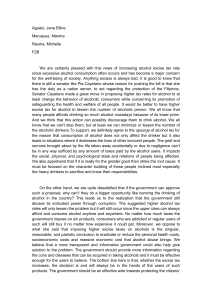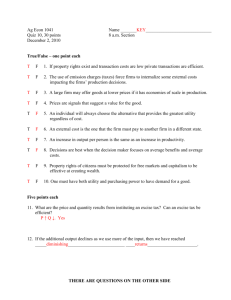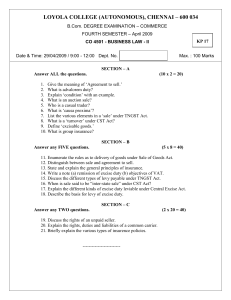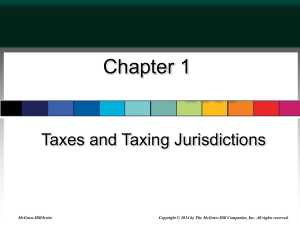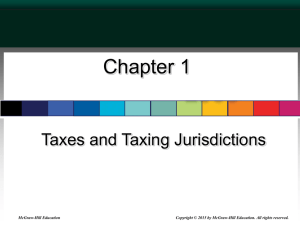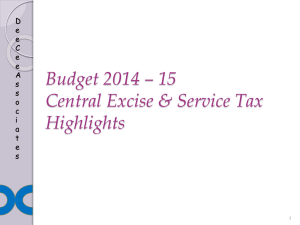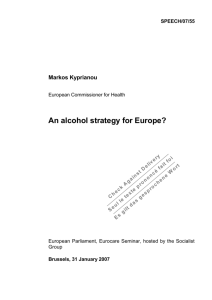fact sheet: tax on alcohol
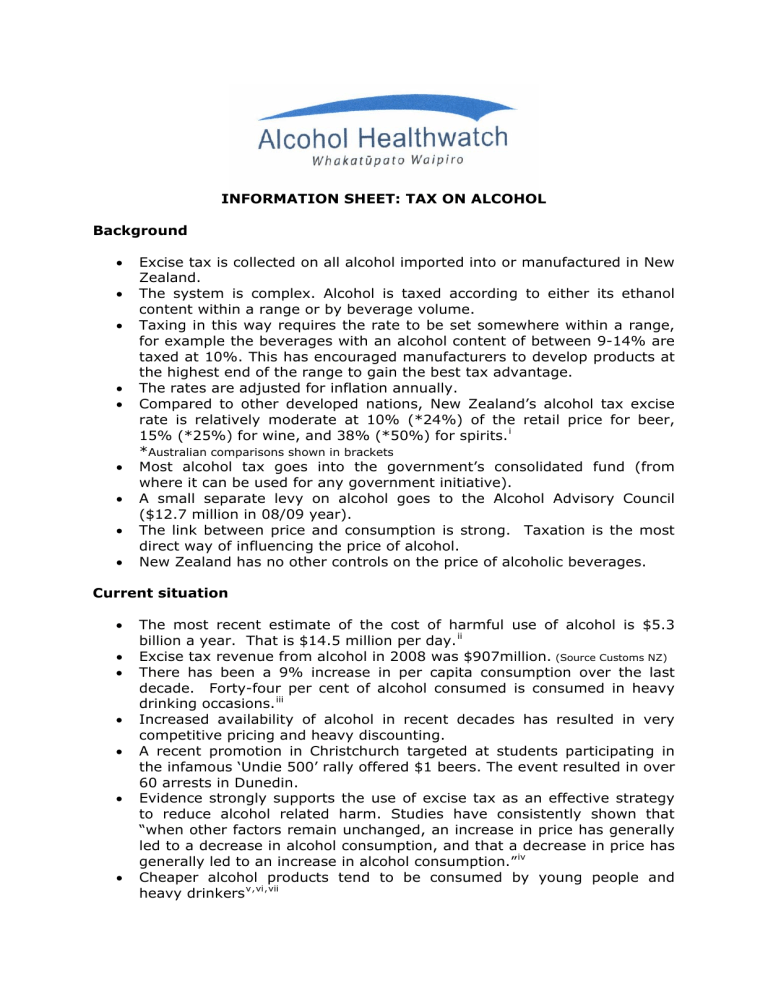
INFORMATION SHEET: TAX ON ALCOHOL
Background
• Excise tax is collected on all alcohol imported into or manufactured in New
Zealand.
• The system is complex. Alcohol is taxed according to either its ethanol content within a range or by beverage volume.
• Taxing in this way requires the rate to be set somewhere within a range, for example the beverages with an alcohol content of between 9-14% are taxed at 10%. This has encouraged manufacturers to develop products at the highest end of the range to gain the best tax advantage.
• The rates are adjusted for inflation annually.
• Compared to other developed nations, New Zealand’s alcohol tax excise rate is relatively moderate at 10% (*24%) of the retail price for beer,
15% (*25%) for wine, and 38% (*50%) for spirits.
* Australian comparisons shown in brackets
• Most alcohol tax goes into the government’s consolidated fund (from where it can be used for any government initiative).
• A small separate levy on alcohol goes to the Alcohol Advisory Council
($12.7 million in 08/09 year).
• The link between price and consumption is strong. Taxation is the most direct way of influencing the price of alcohol.
• New Zealand has no other controls on the price of alcoholic beverages.
Current situation
• The most recent estimate of the cost of harmful use of alcohol is $5.3 billion a year. That is $14.5 million per day.
• Excise tax revenue from alcohol in 2008 was $907million.
(Source Customs NZ)
• There has been a 9% increase in per capita consumption over the last decade. Forty-four per cent of alcohol consumed is consumed in heavy
drinking occasions.
• Increased availability of alcohol in recent decades has resulted in very competitive pricing and heavy discounting.
• A recent promotion in Christchurch targeted at students participating in the infamous ‘Undie 500’ rally offered $1 beers. The event resulted in over
60 arrests in Dunedin.
• Evidence strongly supports the use of excise tax as an effective strategy to reduce alcohol related harm. Studies have consistently shown that
“when other factors remain unchanged, an increase in price has generally led to a decrease in alcohol consumption, and that a decrease in price has generally led to an increase in alcohol consumption.” heavy drinkers
• Cheaper alcohol products tend to be consumed by young people and
• There was a 35% drop in sales of ready-to-drinks (RTDs) following the
67% tax increase on these products in Australia in 2008.
• Recent modeling exercises indicate that minimum price strategies can effectively reduce overall consumption, heavy drinking and drinking by the young.
Key Themes from the Law Commission report – Alcohol in our Lives
• There is a case for increasing the excise tax on alcohol, given the nature and degree of alcohol related harm.
• The flip side of increasing the rate of excise tax generally is to reduce it for low-alcohol products. This would encourage increased marketing of low alcohol products, which could help in reducing alcohol-related harm.
• A minimum pricing scheme would set a minimum price below which alcohol products cannot be sold by retailers. They have been proposed as a way of reducing the consumption of cheaper alcohol products which tend to be favoured by the young and by heavier drinkers.
• The Government of Scotland is currently pursuing a minimum price scheme for alcohol and the Law Commission will watch these developments and analyse them in its final report.
For a full list of the Law Commission’s options and the Alcohol Healthwatch response to these please refer to our Law Commission Tool-kit at www.ahw.org.nz.
An evidence-based response
• Change the current alcohol excise system to one based on the actual alcohol content in beverages, often referred to as a volumetric tax.
• Substantially increase tax in order to increase alcohol prices.
• Introduce a minimum price on alcohol beverages.
What we can expect from an improved alcohol taxation and pricing policy
• Reduced consumption of alcohol by teenagers and moderate to heavy drinkers.
• Reduced additional drinking in a session.
• Help to stop moderate drinkers becoming heavy and chronic drinkers, thus reducing the burden on health and other services.
• Reduction alcohol-related harms including; deaths, injuries, cirrhosis, cancer and other diseases, crime, child abuse, educational failures, sexually transmitted infections, interpersonal violence and suicide.
Furthermore:
• The increased tax revenue can be directed to reducing alcohol-related harm through increased enforcement, health promotion and community action, research and treatment.
References
i World Health Organisation. 2004. Global Status Report: Alcohol Policy. Dept Mental Health
Substance Abuse, Geneva. ii Slack A, Nana G, Webster M, Stokes F, Wu, J. 2009. Costs of harmful alcohol and other drug use.
Final Report to the Ministry of Health and ACC. (BERL report) iii Ministry of Health. 2007. Alcohol use in New Zealand. Analysis of the 2004 New Zealand Health
Behaviours Survey iv Babor T, Caetano R, Casswell S, et al. 2003. Alcohol: No ordinary commodity. Research and
public policy. New York: Oxford University Press. v Chaloupka F, Grossman M, Saffer H. 2002. The effects of price on alcohol consumption and alcohol-related problems. Alcohol Research and Health Vol.26, No. 1, 22-34. vi Grossman M, Coate D and Arluck G. 1987. Price Sensitivity of alcoholic beverages in the United
States. In: Moore, M and Gerstein D, eds. Control Issues in Alcohol Abuse Prevention: Strategies
for States and Communities pp 169-198. Greenwich, CT: JAI Press. vii Laixuthai A and Chaloupka F. 1993. Youth alcohol use and public policy. Contemporary Policy
Issues 11(4) pp 70-81. vii Chikritzhs TN et al. 2009. The “alcopops” tax: heading in the right direction. Med J Aust. 190,
294-5.
For further information
See other Alcohol Healthwatch information sheets and comprehensive policy briefing papers at http://www.ahw.org.nz
To speak with a Health Promotion Advisor for assistance with your submission please call (09) 520 7036
Published by Alcohol Healthwatch September 2009
